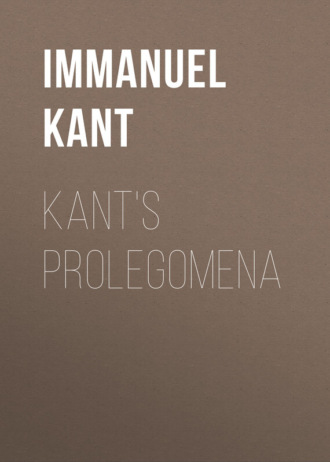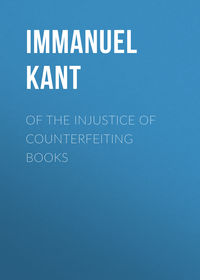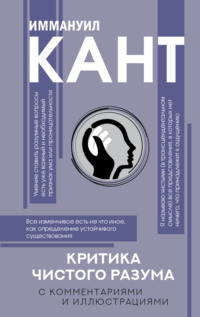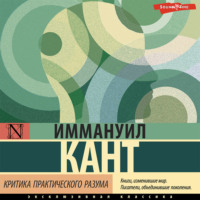 полная версия
полная версияKant's Prolegomena
39
Der die Gegenstände anschaute.
40
The use of the word "world" without article, though odd, seems to be the correct reading, but it may be a mere misprint. – Ed.
41
There is, e.g., an analogy between the juridical relation of human actions and the mechanical relation of motive powers. I never can do anything to another man without giving him a right to do the same to me on the same conditions; just as no mass can act with its motive power on another mass without thereby occasioning the other to react equally against it. Here right and motive power are quite dissimilar things, but in their relation there is complete similarity. By means of such an analogy I can obtain a notion of the relation of things which absolutely are unknown to me. For instance, as the promotion of the welfare of children (= a) is to the love of parents (= b), so the welfare of the human species (= c) is to that unknown [quantity which is] in God (= x), which we call love; not as if it had the least similarity to any human inclination, but because we can suppose its relation to the world to be similar to that which things of the world bear one another. But the concept of relation in this case is a mere category, viz., the concept of cause, which has nothing to do with sensibility.
42
I may say, that the causality of the Supreme Cause holds the same place with regard to the world that human reason does with regard to its works of art. Here the nature of the Supreme Cause itself remains unknown to me: I only compare its effects (the order of the world) which I know, and their conformity to reason, to the effects of human reason which I also know; and hence I term the former reason, without attributing to it on that account what I understand in man by this term, or attaching to it anything else known to me, as its property.
43
Critique of Pure Reason, II., chap. III., section 7.
44
Throughout in the Critique I never lost sight of the plan not to neglect anything, were it ever so recondite, that could render the inquiry into the nature of pure reason complete. Everybody may afterwards carry his researches as far as he pleases, when he has been merely shown what yet remains to be done. It is this a duty which must reasonably be expected of him who has made it his business to survey the whole field, in order to consign it to others for future cultivation and allotment. And to this branch both the scholia belong, which will hardly recommend themselves by their dryness to amateurs, and hence are added here for connoisseurs only.
45
By no means "higher." High towers, and metaphysically-great men resembling them, round both of which there is commonly much wind, are not for me. My place is the fruitful bathos, the bottom-land, of experience; and the word transcendental, the meaning of which is so often explained by me, but not once grasped by my reviewer (so carelessly has he regarded everything), does not signify something passing beyond all experience, but something that indeed precedes it a priori, but that is intended simply to make cognition of experience possible. If these conceptions overstep experience, their employment is termed transcendent, a word which must be distinguished from transcendental, the latter being limited to the immanent use, that is, to experience. All misunderstandings of this kind have been sufficiently guarded against in the work itself, but my reviewer found his advantage in misunderstanding me.
46
Idealism proper always has a mystical tendency, and can have no other, but mine is solely designed for the purpose of comprehending the possibility of our cognition a priori as to objects of experience, which is a problem never hitherto solved or even suggested. In this way all mystical idealism falls to the ground, for (as may be seen already in Plato) it inferred from our cognitions a priori (even from those of geometry) another intuition different from that of the senses (namely, an intellectual intuition), because it never occurred to any one that the senses themselves might intuite a priori.
47
The reviewer often fights with his own shadow. When I oppose the truth of experience to dream, he never thinks that I am here speaking simply of the well-known somnio objective sumto of the Wolffian philosophy, which is merely formal, and with which the distinction between sleeping and waking is in no way concerned, and in a transcendental philosophy indeed can have no place. For the rest, he calls my deduction of the categories and table of the principles of the understanding, "common well-known axioms of logic and ontology, expressed in an idealistic manner." The reader need only consult these Prolegomena upon this point, to convince himself that a more miserable and historically incorrect, judgment, could hardly be made.









